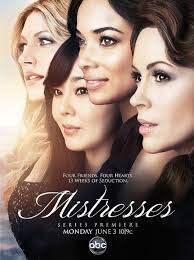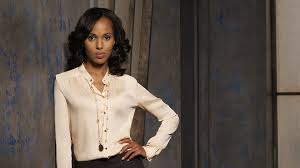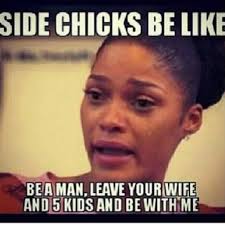So, the question has been asked, is 2014 the year of the side chick? When thinking about this there are a few things to consider. Is this a declaration, a compliment, or a fear? According to popular media, side chicks, or women (usually women of color) who are knowingly in a relationship with a man who is already in a relationship are on the rise. However, side chicks existed long before reality TV, BET and tabloids. When I was growing up it was not uncommon for a man to have a woman at home (usually the mother of his children) and then a PYT (pretty young thing) on the side. Everybody, including the wife, would know about the “other woman,” but everybody played their position and kept their mouths shut and their opinions to themselves. So in 2014, do we glorify side chicks for misappropriating defenseless dudes, or are we unfairly blaming them for getting caught up?
I believe there is a race and class analysis missing from the slut shaming narrative attached to women of color who find themselves (knowingly and/or unknowingly) sharing a man. The cultural dynamic is damning…and so is the language. We use language and naming to punish, disgrace and denigrate black women who find themselves in their feelings over a man who is not in his feelings over her. We have no sympathy for heterosexual black women who in a dwindling dating economy are more likely to be perpetually single than ever married. We judge her for her choices, shake our heads at her nerve, and dare her to have human needs. This is similar to how working-class women of color have been treated, particularly in relation to (unconventional) love relationships, for years. Things are framed differently if/when the “other woman” is middle to upper class or white. The racial and class-based distinctions of side-chickness are worthy of critique.
Soap operas have long glamorized the side chicks of powerful white men, making her seem more exciting, loving and desirable than the wives at home, who were equally beautiful but played out. It seemed that as long as a man could “afford” two women (and upper-class men were generally white men), it was his prerogative, and not worthy of attention or appraisal. Working-class black men and the women they juggle (baby mamas, friends with bennies, main chicks), however, are seen as cultural taboos and degenerates with no self-esteem or shame. Further, upper-class black men (like Sean Combs, for example) are excused from harsh judgment because of their ability to financially support multiple women and children. On the flip side, independent black women who are financially secure have been (until the recent rise and reception of television shows to the contrary) largely left alone.
While the so-called side chick phenomenon is nothing new, the language/slang repackages infidelity as something black folk invented, therefore making it more tawdry and scandalous. White women who have affairs with married men are called mistresses. Women of color who have sex with men in relationships are called side chicks. Mistresses are taken care of, taken out, splurged on and at times prioritized above the wife. Side chicks are secrets, limited to booty calls and late night texts, and are expected to play their position (never interfering with a man’s ‘real’ relationship). There is usually one mistress, but a side chick is generally one of several. These race based distinctions contribute to ongoing slights towards black women. Mistresses are white and upper-class and therefore redeemable. Side chicks are poor and of color and are therefore viewed as thirsty, grimy, low down, gold-digging whores who actively pursue somebody else’s man. There’s something wrong with that picture.

Further, why are side chicks vilified while dudes who have side chicks are celebrated? The fact that men are not held accountable for their culpability in the destruction of their own relationships, and the onus is almost always and exclusively put on “the other woman,” implies that men can’t help it, that they are biologically wired to be promiscuous (bullshit). This makes it the responsibility of wives or main chicks to hold their man’s attention, and the responsibility of potential side chicks to resist their advances. Men, in this dynamic, have no liability for their actions. If they get caught they blame the side chick for seducing him from home. (Bullshit).
The responsibility for fidelity should rest on the shoulders of men who are in committed relationships. They should a) be faithful, b) if they don’t plan on being faithful, they should end their relationship, c) at the very least, if they don’t plan on being faithful they should be up front about their relationship status, at which point then both he and the person he is involved with on the side are equally informed and responsible, d) wear a sign, not unlike the scarlet letter, to let unsuspecting women know what he’s about on sight. It’s infuriating that while men are out here doing the damn thing all willy nilly it is women who are at each other’s throats.
The commentary is telling. We call women who are involved with men in multiple relationships stupid, a jump off, a side chick, a side piece, or a THOT. We call the main woman the ride or die (because she is willing to tolerate infidelity), the main chick (because she was there first), wifey (because she is either married to him, has a child with him, or is holding out for either of the two), or bae, but what do we call a man who has a side chick?
I’ll wait.
Right.
No accountability, no consequences.
Part of the cultural fascination with and glorification of side chicks is attached to our complicated viewing relationship with shows like Being Mary Jane, Scandal and Love & Hip Hop. Olivia Pope and Mary Jane Paul are fictional characters playing out real lived experiences. I know women who have unknowingly been a side chick, myself included. Women who unbeknownst to them were sharing a man they thought was exclusively theirs, or they believed to not be in an exclusive relationship with someone else.
In popular culture there is and has been a tendency to credit and/or blame black women for the existence and/or popularity of the side chick. From video vixens, groupies and regretful exes to a political powerhouse, news reporter and wannabe, we have, in the past few years, watched black women on TV go for the jugular, fighting over unfaithful men like they are going out of style. Three such shows (Being Mary Jane, Scandal and Love and Hip Hop: Atlanta) were created and/or produced by powerful black women, Mara Brock Akil, Shonda Rhimes, and Mona Scot-Young. It is telling, I believe, to think about the stories and storylines these shows pursue about the naiveté and poor choices professional women of color sometimes make in their love lives. It is not, in my opinion at least, a glorification of the side chick, but rather a commentary on black love relationships and the plight black women often find themselves in when trying to establish, maintain or end relationships with black men.
One commentary, for Mary Jane at least, may be that the dating pool for professional black women in positions of power are not particularly deep (in fact, they can be as shallow as a kiddie pool). However, instead of considering the fact that many black women share the same concerns (about having a biological family) and fears (of being alone), folk seem to be more interested and invested in seeing her as a Jezebel than empathizing with her circumstances, despite the fact that she did not knowingly pursue a relationship with a married man, a married man knowingly pursued a relationship with her. (I am aware that Mary Jane, in her desperation for love, eventually becomes “that woman” when she pursues her ex, knowing he has moved on with a new love–she was, however, tipsy at the time, stopping to give her married man’s wife oral sex tips the same night. Le sigh.).
Granted, the fictional Olivia Pope is another story. Her affair with the leader of the free world was both intentional and shady (being that she befriended the wife), but for whatever reason (perhaps because her lover is white, and his wife is white, so her affair is not jeopardizing a black woman’s relationship or “black” family), black women ain’t mad like that over Olivia. Perhaps it is as my friend Kristen Warner says, the idea of a black woman (regardless of hue) getting busy with a white POTUS is so much of a fantasy, folk (black women in particular) get caught up in the dream, blame the wife, not the mistress, and look for ways to justify Olitz’s torrid affair.
And Love & Hip Hop Altanta reveals the hot ass mess that is a relationship with a perpetually unfaithful man. The triangle between Stevie J, Joseline and Mimi began with Joseline being the side to Mimi’s main, and ended with Joseline being a wife and Mimi becoming a porn star. But Stevie J is no prize. He is and has been unfaithful, and if he cheated with Joseline, he will cheat on her, no matter how good her sex is.
Cheating is rarely about pleasure, it’s about power. People cheat because they can, not because they are not necessarily getting what they need at home. Make your man take a lie detector test if you suspect he’s cheating on you. Some dudes are greedy, they want their cake and everybody else’s too. And that is about power and manipulation, not love (or hip hop).
And of course, there are exceptions. Some women are just thirsty. (Did you see that Sorry Ms. Carter video? Chile, bye).
While I am not condoning the behavior of women who are homewreckers for sport, I am confused about why the conversation is focused on the so-called sins of women and not the infidelity of men. Side chicks may not always be innocent and ignorant victims (though sometimes I believe they are), but the men with whom they are in relationship (sexual or otherwise) are damn sure more culpable than they are. If a man or woman is in a relationship with a man or woman and actively pursues, seduces, sleeps with, spends time with, takes out, eats out, or otherwise engages another person other than their partner, how the hell is the angst always towards the ‘other’ woman?
Even in a fictional context, Fitz openly and unapologetically disses his wife for his lover. And while Scandal fans (myself included) generally applaud the shade he throws his wife while indulging between the legs of another woman, it’s not quite right, and he’s not quite right. Our conversations about accountability need to be better.
So, do I think 2014 is the year of the side chick? Nah, no more than any other year is or will be. I do think, however, that it’s time for us to re-frame the narrative and think about why it is so easy for society to excuse the misbehavior of men and blame women, especially black women, for the demise of traditional love relationships. Perhaps instead of trying to police black women’s bodies and behaviors we should start pointing the finger at the men who get lost in the discussion and the equation.
Credit: https://altindex.com/meme-stocks




And BAM!!! There it is!! #Absolutetruths!!
I Loved Every Moment Of This Piece!
I 100% agree with your analysis and I suggest that the first way to reframe the narrative is to reflect on the ways that we OURSELVES reproduce the glorification of the side chick, which I believe you allude to with you own auto ethnographic reflections. I’m complicit as well as I reflect on my musings watching Being Mary Jane, Scandal and Love and Hip Hop. Where does one begin? See you at NWSA!!!!
I’ve enjoyed your detailed analysis on such a relevant topic. As a black male, I have, I think, two cents to offer towards to conversation:
There once was a time when certain sectors of society embraced the feminine figure with great reverence. In essence, she was fragile and esteemed with divine characteristics. Her purity was unprecedented and her beauty was unmatched. Her virginity symbolized her untaintedness. Her self-discipline over her own power to seduce was applauded and admired. In modern society, remanents of many of these innate attributes bestowed upon the female figure, still remain embedded within the public notion of what a woman’s identity should look like. Deviation from this perhaps, unrealistic or fairytale portrait or womanhood, is often frowned upon and seen as a let-down. Be it right or wrong, accurate or inaccurate, this standard seems to be a natural expectation set for women.
A woman who fails to meet and exceed these expectations, is criticized, condemned and disgraced. However, for whatever reason, such expectation isn’t synonymous with the masculinity of the male, therefore, his malignant behavior is not met with the same level of public scrutiny. Will the sinister role of the male within the context of a relationship ever be equally condemned, I don’t know, but as women continue to redefine who she is and rewrites her own destiny, over time, the loud voice of discontentment will grow weak and faint.
So on target with this!
I say get over it. Woman on the side, man on the side, woman/man in the middle, wife or primary relationship, straight or same sex. Get a life.
I’ve observed how “polygamy” pops up in public parlance every so often, to formalise the position of “wifey”, “matey”, and the like. Even “skettels” need love too, right? But deeper than just slang terms, I observe how some men manipulate these arguments to put a pretty cloak on the same old oppression. Wifey, co-wife, second-third-whatever wife can be useful economic, social, and political assets. There are women who knowingly enter such relationships for their own reasons, usually in times of the so-called “man shortage”. However truly open relationships, networks of marriages and alliances, often maintain and contain their own secrets, lies and half-truths under cover.
Great article… lots for us to think about in terms of the reality of the monogamous black marriage, black families, freedom and choice.
I think the analysis you did between the men who have mistresses and the women who are mistresses was eye-opening. I had never really thought about what it meant to be a side chick in movies/tv shows, but the way you demonstrated the disparity between how men and women of color are treated versus how white men and women are treated in their positions, shows how damaging that portrayal is to our society.
Men and women of color are already a step behind their white counterparts, and although we are making huge strides in changing that, the misrepresentation people of color in the media has got to change.
Good Stuff
This article was so bomb. Ive been thinking about this!